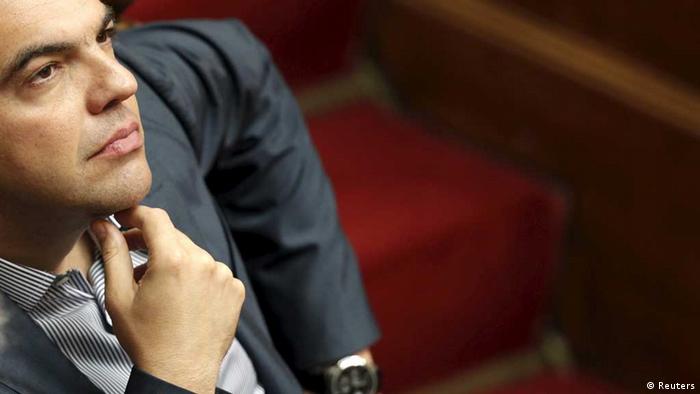EUROZONE CRISIS
Opinion: The end of populism
Now that the eurozone has agreed on a new aid package for Greece, Alexis Tsipras has to prove what he's capable of. Reforms must soon be implemented, and it certainly won't be easy, says DW's Spiros Moskovou.
Alexis Tsipras, the left-wing populist, promised crisis-ridden Greece a return to dignity and democracy, thereby securing his win in the early election that took place at the end of January.
The Greek prime minister tried to impress his country's international creditors with a strong vote of confidence from his electorate in the short-notice referendum last month - to no avail. Ultimately, too many stood against Greece and Tsipras' vision turned into a national nightmare. Sunday's eurozone summit meeting lasted a dramatic 17 hours, during which Tsipras had to backpedal to save what he could: Greece's place in the eurozone - but under very strict conditions.
Governing is not easy
Since Monday, the Greek prime minister has been forced to do what politicians are voted into office for: to govern. Considering the moribund economy and the fact that banks are closed, pledging dignity for the people and reading the riot act abroad is not enough.
Lo and behold: governing is hard work. At least two ministers in Tsipras' cabinet have categorically rejected the agreement with the EU partners, and some 40 Syriza parliamentarians are threatening to vote against the agreement on Wednesday.
Tsipras' ultra right-wing coalition partner, Defense Minister Panos Kammenos, has promised his support in parliament, but he has reserved the right to vote against individual reform measures in the future.
As if that weren't enough, the economically unviable and inflated public sector, of all groups, has announced a general strike for Wednesday. Tsipras did not plant his populist seed in his five months as Greece's leader, but rather, in the past five years as the opposition leader. Now he must now face the hefty consequences.
All or nothing
By last weekend - at the latest - Tsipras must have realized that he has been putting Greece's entire future at stake. And now he will try to harness revolts in his own ranks. The radical ministers have to go, so he will soon reshuffle his cabinet. On Wednesday, parliament will approve of the agreement with international institutions. Tsipras can be sure of one thing: Regardless of how Syriza parliamentarians act, the pro-European opposition will support the necessary austerity and reform plans.
The Greek prime minister does not seem to realize the fact that approval of the measures is only the first step. The real work begins when the measures are implemented. Then, a party divided into "pragmatists" and "idealists" is of no use to him; even less so the completely backward political philosophy of Syriza, which fosters the idea of the state being a substitute for a lack of social security, demonizes yet goes easy on the rich and at the same time portrays parasitic public administration as an achievement. All of these factors are unrelated to a competitive Greece that is a member of the eurozone.
In summary, even after the vote in parliament on Wednesday, the country will remain unstable - more than a bad omen for a new beginning that deserves to be called one.
Join the conversation - add your comment below.


No comments:
Post a Comment